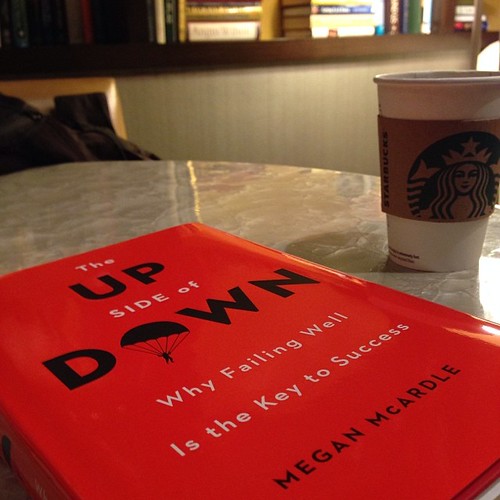 Megan McArdle has failed. By her own admission, she has failed multiple times, from her love life to her career choices. Which makes her the perfect person to write the book on failure.
Megan McArdle has failed. By her own admission, she has failed multiple times, from her love life to her career choices. Which makes her the perfect person to write the book on failure.
The Up Side of Down argues that we all must learn to fail a little better, a little faster and to, most importantly, learn from the experience. There is no growth without failure, whether we’re talking economies or individuals.
McArdle bolsters her case with examples from business, medicine, physchology and economics. Discussing everything from the learning styles of children to the Solyndra debacle, she offers a kaleidoscope-look at the varieties of American failure.
And she makes a really important point on failure – we’re a nation founded by people who couldn’t hack it in the Old World. It wasn’t comfortable lords who built this country but starving peasants willing to risk a sea voyage for the opportunity to start anew. These failures created the greatest nation on earth.
One of the best chapters in the book discusses the plague of long-term unemployment, a problem once unique to Europe that has become an American scourge. McCardle writes with great compassion about people who have been unemployed for longer than a year, and the cruelties of the job market that keep them that way. She likens unemployment to a dark room that you’ve stumbled into. The people who get out are the ones who keep moving, pursuing multiple opportunities in hopes that one of them will pay off.
 McArdle’s career illustrates this principle. An MBA who was jobless following 9/11, she (among other activities) started blogging, which led to positions at The Economist, the Atlantic and Bloomberg View. Blogging was just one of several different options that she pursued during unemployment.
McArdle’s career illustrates this principle. An MBA who was jobless following 9/11, she (among other activities) started blogging, which led to positions at The Economist, the Atlantic and Bloomberg View. Blogging was just one of several different options that she pursued during unemployment.
It is to our benefit that she found success as a blogger. McArdle is one of the best explainers of economic ideas (far better than the needlessly wonky and overrated Ezra Klein). She takes the dismal science and puts it into terms anyone can understand, using examples from her own life.
For example, her desperate pursuit of a man who didn’t want her illustrates the idea of “sunk costs.” She had put in too many years to give up, having invested too much emotionally to just walk away. The failure was so devastating that she left NYC, moved to DC, and found her future husband – an example of the positive aspects of failure.
Interestingly, she cites surveys where many people cite failures – getting fired or divorced -as the best thing that ever happened to them. These calamities prompted people to try new things and find love elsewhere. We are “failure machines,” willing to try different solutions until we find the one that works. As Winston Churchill said, “Success is not final, failure is not fatal: it is the courage to continue that counts.”
We need more failures. Like Steve Jobs. Prior to the Macintosh, he failed with the Lisa, an overpriced personal computer that no one wanted. And before the success of the iPhone, there was the ignominy of the Newton. Jobs kept iterating, coming up with new ideas and new products, undaunted. Taking lessons from each failure enabled Jobs to find his way to success
McArdle discusses young journalists who sabotage their own careers by just giving up. So afraid of turning in a lousy manuscript, they write nothing. But a terrible first-draft can be fixed; one that doesn’t exist cannot. McCardle tells writers that they have permission to suck, realizing that this simple bit of advice is key to unlocking creative potential.
America needs to regain its taste for failure, something we have lost in the malaise of the Obama Economy. Risk-taking needs to be encouraged once again. Failures are learning experiences. Failures indicate confidence in the future – we’re willing to try new things, to make investments, to take chances.
“We have a strategic plan. It’s called doing things.” I love this quote by Herb Kelleher, founder of Southwest Airlines. It perfectly expresses the optimism and can-do nature of the American spirit. We’re going to keep trying things until we find what works. Even if that means failure. Especially if it does.
The Up Side of Down is an overview of failure. We must embrace failure, treasure it, and, most importantly, learn from the experience. The secret to success is rooted in the hard lessons of failure.